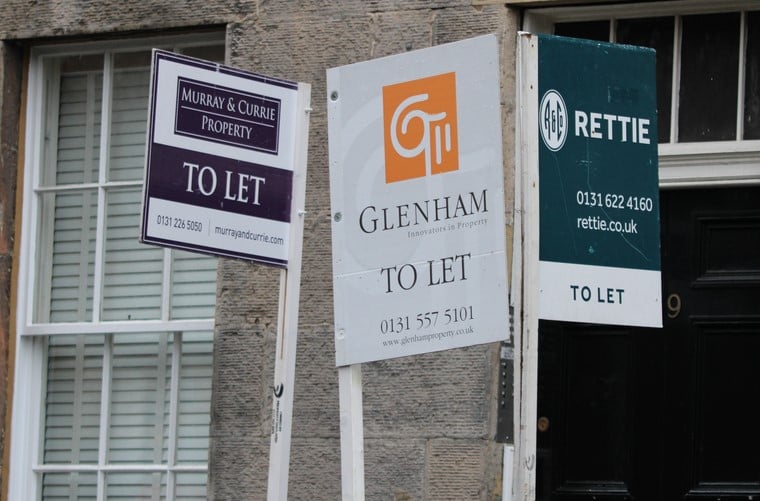
0:01 AM, 18th July 2024, About 6 months ago 3
Text Size
Average rents in the UK increased by 8.6% in the 12 months leading up to June – a slight dip from the 8.7% annual rise seen in May, the Office for National Statistics (ONS) reports.
Its Price Index of Private Rents (PIPR) measures inflation in private rents for both new and existing tenancies.
The index shows that rents in England reached £1,310, reflecting an 8.6% increase, and in Wales they rose to £743, up 8.2%.
In Scotland, rents hit £959, showing an 8.4% increase, and Northern Ireland rents reached 10.3%.
Within England, London experienced the highest rent inflation at 9.7%.
Meanwhile, the North East saw the lowest increase, at 5.9%.
Propertymark’s chief executive, Nathan Emerson, said: “There has been much insecurity across the rental market over recent years due to aspects such as uncertainty surrounding the Renters (Reform) Bill, increases in taxes, and a lack of clarity regarding regulation.
“In real terms, this anxiety has impacted new investment and, in extreme cases, has even prompted landlords to leave the sector, further compounding the issue surrounding available housing stock.”
He added: “The rental sector urgently needs investment to keep pace with demand, and Propertymark is keen to see the UK government closely review all elements and generate new legislation that promotes investment, but above all, provides full fairness to both landlords and tenants alike.”
The ONS report says: “London was the English region with the highest rents inflation in the 12 months to June 2024, at 9.7%, down from 10.1% in the 12 months to May 2024.
“This was below the record-high annual rise of 11.2% in March 2024. London’s annual inflation rate slowed because average rent prices rose more slowly in June 2024 than they did a year earlier.
“Rents annual inflation was lowest in the North East, at 5.9% in June 2024, down from 6.1% in May 2024, which was the joint record-high annual rise with February 2023 and March 2024.
“In June 2024, the average rent was highest in London (£2,098) and lowest in the North East (£669).”
Emma Cox, the managing director of real estate at Shawbrook, said: “Professional landlords will be hoping for some post-election pricing consistency, and will also be keeping an eye out for any announcements from the new government which may have an impact on the buy-to-let market.
“For the time being, landlords will be keeping a watchful eye on prices and rates to explore any opportunities to expand their portfolios.”
Sam Reynolds, the chief executive of Zero Deposit, said: “Much of the noise leading up to the election was predictably focussed on the housing market, however, with rents continuing to climb, it’s imperative our new government gives the current rental crisis the focus it deserves.
“We need more rental homes and ultimately, it is what they’ll be judged on as the single most important initiative to solve the demand-supply imbalance and the considerable rental cost inflation.”
Meanwhile, the Office for National Statistics also reveals that the UK’s house prices saw a year-on-year increase of 2.2% in May, reaching an average of £285,000.
This is a rise from the 1.3% increase reported in April 2024.
The price increase trend continued across the nations within the UK:
Previous Article
Section 21 'no-fault' evictions will be banned - King's Speech
Fed Up Landlord
Become a Member
If you login or become a member you can view this members profile, comments, posts and send them messages!
Sign Up5:02 AM, 18th July 2024, About 6 months ago
“For the time being, landlords will be keeping a watchful eye on prices and rates to explore any opportunities to expand their portfolios.”
What planet are they on?
Kopf Schmerz
Become a Member
If you login or become a member you can view this members profile, comments, posts and send them messages!
Sign Up12:24 PM, 18th July 2024, About 6 months ago
With housing costs representing 30% of the inflation index, higher rates are a self fulfilling prophecy in terms of driving the index and rents in particular. If government and the BoE have any joined up thinking they will know that cutting rates will cut the index increment or certainly a major driver. Are they actually paying attention to the risks of keeping interest rates too high for too long? I can’t see it.
Paul Essex
Become a Member
If you login or become a member you can view this members profile, comments, posts and send them messages!
Sign Up17:29 PM, 18th July 2024, About 6 months ago
I can't remember seeing stories when rent rises were below inflation.